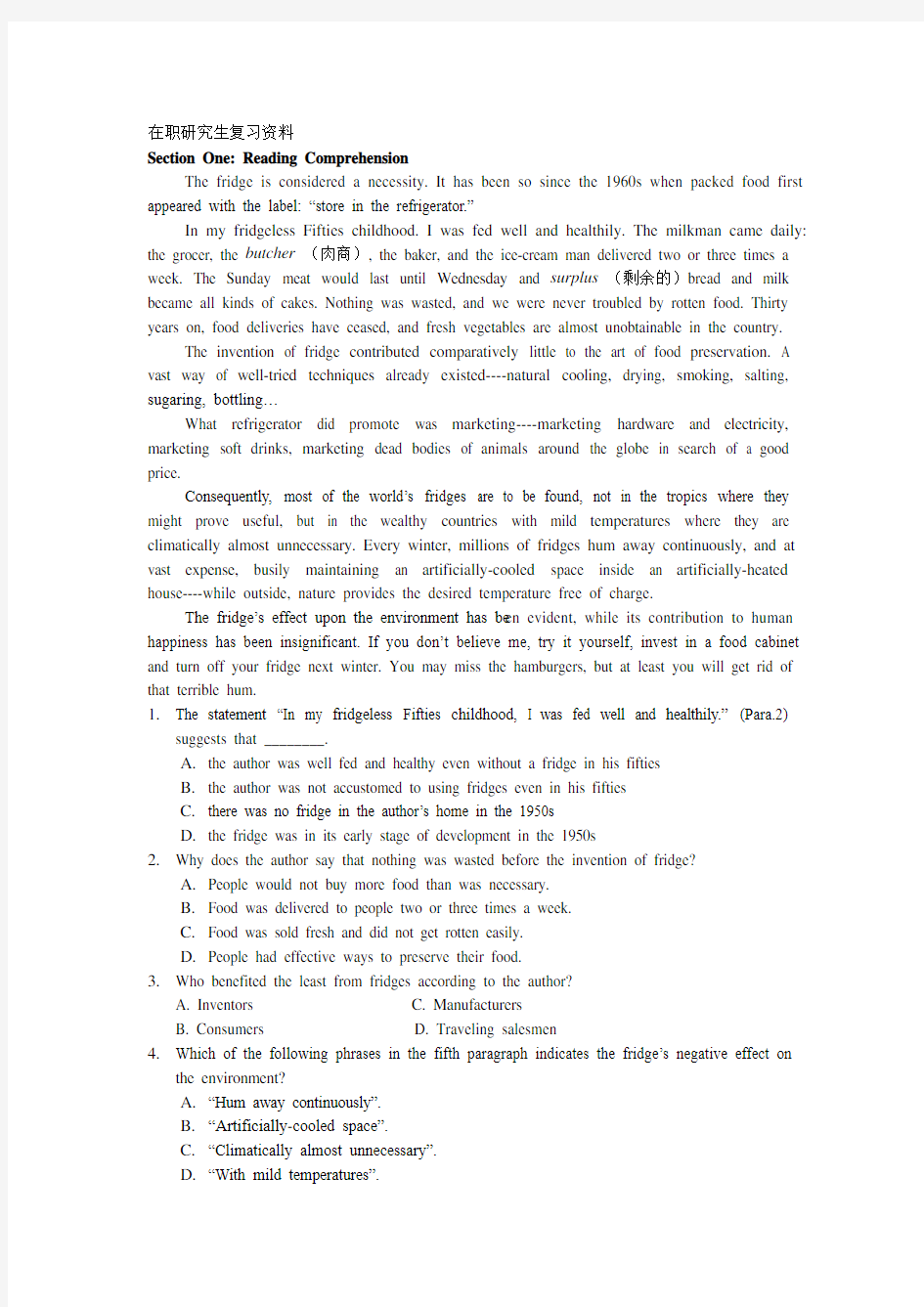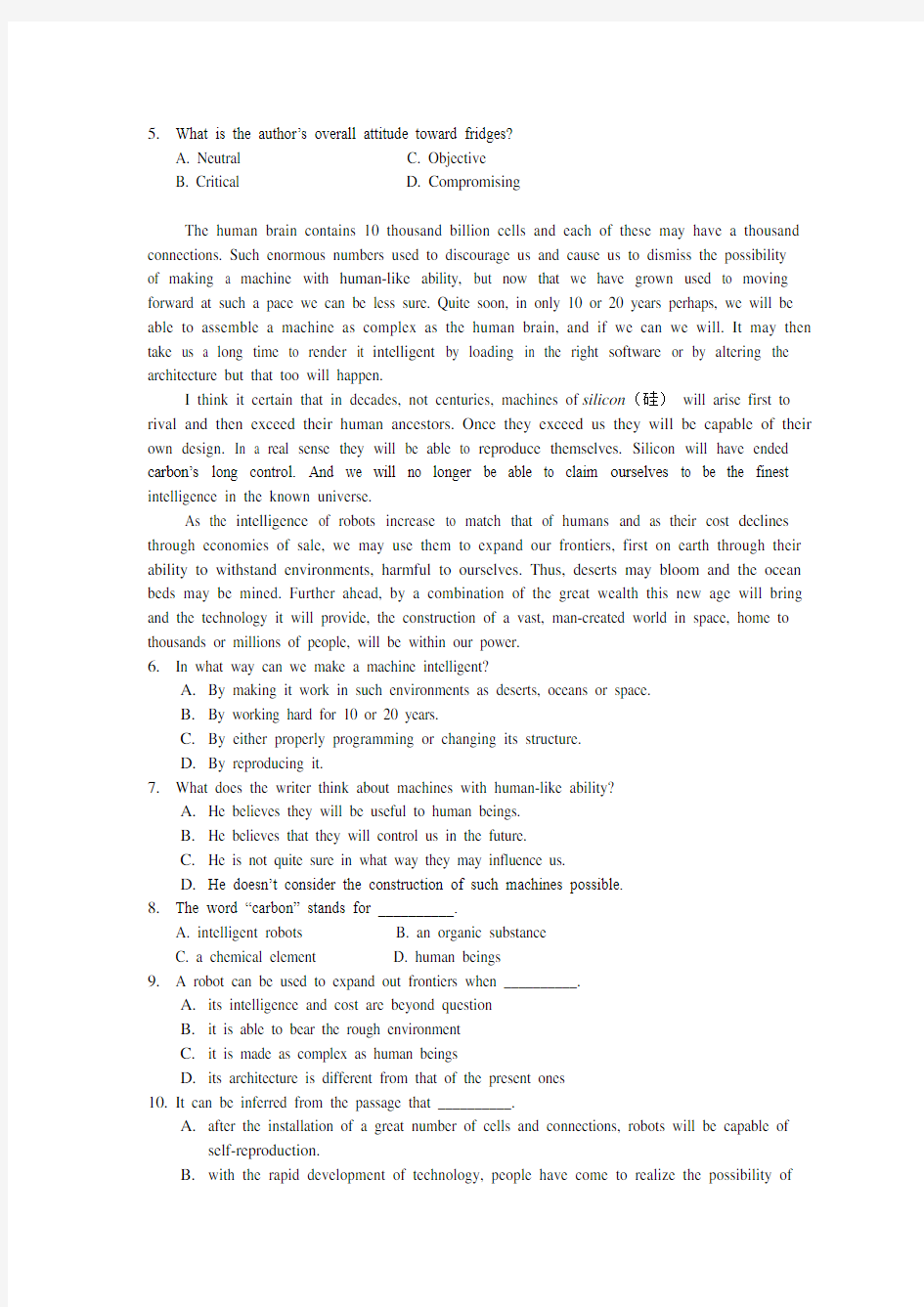在职研究生复习资料


在职研究生复习资料
Section One: Reading Comprehension
The fridge is considered a necessity. It has been so since the 1960s when packed food first appeared with the label: “store in the refrigerator.”
In my fridgeless Fifties childhood. I was fed well and healthily. The milkman came daily: the grocer, the butcher(肉商), the baker, and the ice-cream man delivered two or three times a week. The Sunday meat would last until Wednesday and surplus(剩余的)bread and milk became all kinds of cakes. Nothing was wasted, and we were never troubled by rotten food. Thirty years on, food deliveries have ceased, and fresh vegetables are almost unobtainable in the country.
The invention of fridge contributed comparatively little to the art of food preservation. A vast way of well-tried techniques already existed----natural cooling, drying, smoking, salting, sugaring, bottling…
What refrigerator did promote was marketing----marketing hardware and electricity, marketing soft drinks, marketing dead bodies of animals around the globe in search of a good price.
Consequently, most of the world’s fridges are to be found, not in the tropics where they might prove useful, but in the wealthy countries with mild temperatures where they are climatically almost unnecessary. Every winter, millions of fridges hum away continuously, and at vast expense, busily maintaining an artificially-cooled space inside an artificially-heated house----while outside, nature provides the desired temperature free of charge.
The fridge’s effect upon the environment has be en evident, while its contribution to human happiness has been insignificant. If you don’t believe me, try it yourself, invest in a food cabinet and turn off your fridge next winter. You may miss the hamburgers, but at least you will get rid of that terrible hum.
1.The statement “In my fridgeless Fifties childhood, I was fed well and healthily.” (Para.2)
suggests that ________.
A.the author was well fed and healthy even without a fridge in his fifties
B.the author was not accustomed to using fridges even in his fifties
C.there was no fridge in the author’s home in the 1950s
D.the fridge was in its early stage of development in the 1950s
2.Why does the author say that nothing was wasted before the invention of fridge?
A.People would not buy more food than was necessary.
B.Food was delivered to people two or three times a week.
C.Food was sold fresh and did not get rotten easily.
D.People had effective ways to preserve their food.
3.Who benefited the least from fridges according to the author?
A. Inventors C. Manufacturers
B. Consumers D. Traveling salesmen
4.Which of the following phrases in the fifth paragraph indicates the fridge’s negative effect on
the environment?
A.“Hum away continuously”.
B.“Artificially-cooled space”.
C.“Climatically almost unnecessary”.
D.“With mild temperatures”.
5.What is the author’s overall attitude toward fridges?
A. Neutral C. Objective
B. Critical D. Compromising
The human brain contains 10 thousand billion cells and each of these may have a thousand connections. Such enormous numbers used to discourage us and cause us to dismiss the possibility of making a machine with human-like ability, but now that we have grown used to moving forward at such a pace we can be less sure. Quite soon, in only 10 or 20 years perhaps, we will be able to assemble a machine as complex as the human brain, and if we can we will. It may then take us a long time to render it intelligent by loading in the right software or by altering the architecture but that too will happen.
I think it certain that in decades, not centuries, machines of silicon(硅)will arise first to rival and then exceed their human ancestors. Once they exceed us they will be capable of their own design. In a real sense they will be able to reproduce themselves. Silicon will have ended carbon’s long control. And we will no longer be able to claim ourselves to be the finest intelligence in the known universe.
As the intelligence of robots increase to match that of humans and as their cost declines through economies of sale, we may use them to expand our frontiers, first on earth through their ability to withstand environments, harmful to ourselves. Thus, deserts may bloom and the ocean beds may be mined. Further ahead, by a combination of the great wealth this new age will bring and the technology it will provide, the construction of a vast, man-created world in space, home to thousands or millions of people, will be within our power.
6.In what way can we make a machine intelligent?
A.By making it work in such environments as deserts, oceans or space.
B.By working hard for 10 or 20 years.
C.By either properly programming or changing its structure.
D.By reproducing it.
7.What does the writer think about machines with human-like ability?
A.He believes they will be useful to human beings.
B.He believes that they will control us in the future.
C.He is not quite sure in what way they may influence us.
D.He doesn’t consider the construction of such machines possible.
8.The word “carbon” stands for __________.
A. intelligent robots
B. an organic substance
C. a chemical element
D. human beings
9. A robot can be used to expand out frontiers when __________.
A.its intelligence and cost are beyond question
B.it is able to bear the rough environment
C.it is made as complex as human beings
D.its architecture is different from that of the present ones
10.It can be inferred from the passage that __________.
A.after the installation of a great number of cells and connections, robots will be capable of
self-reproduction.
B.with the rapid development of technology, people have come to realize the possibility of
